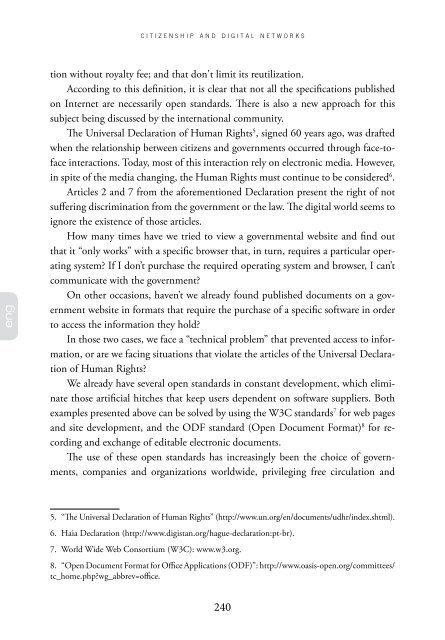Sergio Amadeu da Silveira - Cidadania e Redes Digitais
Sergio Amadeu da Silveira - Cidadania e Redes Digitais
Sergio Amadeu da Silveira - Cidadania e Redes Digitais
You also want an ePaper? Increase the reach of your titles
YUMPU automatically turns print PDFs into web optimized ePapers that Google loves.
eng<br />
c i t i z e n s h i p a n d d i g i t a l n e t w o r k s<br />
tion without royalty fee; and that don't limit its reutilization.<br />
According to this definition, it is clear that not all the specifications published<br />
on Internet are necessarily open stan<strong>da</strong>rds. There is also a new approach for this<br />
subject being discussed by the international community.<br />
The Universal Declaration of Human Rights 5 , signed 60 years ago, was drafted<br />
when the relationship between citizens and governments occurred through face-toface<br />
interactions. To<strong>da</strong>y, most of this interaction rely on electronic media. However,<br />
in spite of the media changing, the Human Rights must continue to be considered 6 .<br />
Articles 2 and 7 from the aforementioned Declaration present the right of not<br />
suffering discrimination from the government or the law. The digital world seems to<br />
ignore the existence of those articles.<br />
How many times have we tried to view a governmental website and find out<br />
that it “only works” with a specific browser that, in turn, requires a particular operating<br />
system? If I don’t purchase the required operating system and browser, I can’t<br />
communicate with the government?<br />
On other occasions, haven’t we already found published documents on a government<br />
website in formats that require the purchase of a specific software in order<br />
to access the information they hold?<br />
In those two cases, we face a “technical problem” that prevented access to information,<br />
or are we facing situations that violate the articles of the Universal Declaration<br />
of Human Rights?<br />
We already have several open stan<strong>da</strong>rds in constant development, which eliminate<br />
those artificial hitches that keep users dependent on software suppliers. Both<br />
examples presented above can be solved by using the W3C stan<strong>da</strong>rds 7 for web pages<br />
and site development, and the ODF stan<strong>da</strong>rd (Open Document Format) 8 for recording<br />
and exchange of editable electronic documents.<br />
The use of these open stan<strong>da</strong>rds has increasingly been the choice of governments,<br />
companies and organizations worldwide, privileging free circulation and<br />
5. “The Universal Declaration of Human Rights” (http://www.un.org/en/documents/udhr/index.shtml).<br />
6. Haia Declaration (http://www.digistan.org/hague-declaration:pt-br).<br />
7. World Wide Web Consortium (W3C): www.w3.org.<br />
8. “Open Document Format for Office Applications (ODF)”: http://www.oasis-open.org/committees/<br />
tc_home.php?wg_abbrev=office.<br />
240


